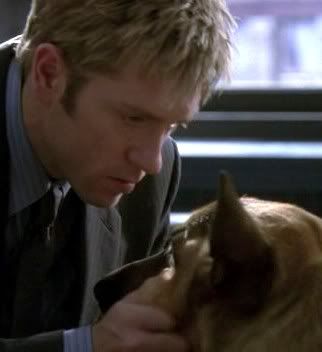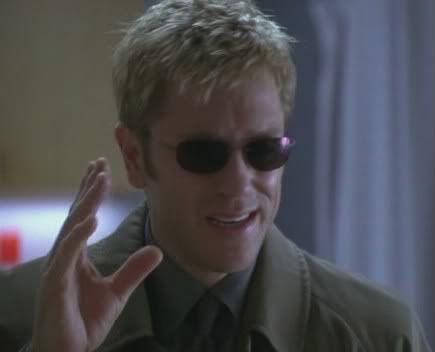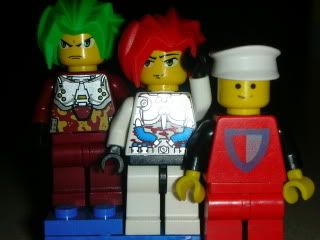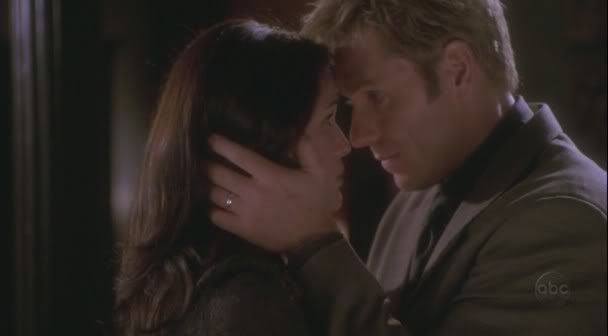|
|
Post by mlm828 on Sept 4, 2005 15:58:26 GMT -5
You've given me lots of food for thought, as usual, maggie. I want to add one observation, then respond to some of your points.
It occurs to me that Karen is tested very early in the Pilot, when Jim insists he smells cordite, indicating a gun was fired in the stolen SUV. I don't think it's necessarily "out of the box" to smell cordite and deduce a gun was fired. Rather, the issue is whether Karen believes Jim really detected the odor of cordite, which she apparently doesn't smell. To this point, he hasn't demonstrated that he's usually right, and she is openly skeptical. So why does she go along with him? Has his reputation preceded him? Or is it the force of his personality when he insists the vehicle is a crime scene? Or is she deferring to a more experienced detective? Or does she believe in the cliche that he has a heightened sense of smell because he's blind? Or is she just taking the path of least resistance when she calls for a crime scene unit? Whatever her reasons, it's critical that she goes along with him, because it's his first opportunity to show her that she can rely on him in working a case.
Regarding Jim's ability to think "out of the box," I think this is probably his most important asset as a detective. But it's not just thinking creatively. He's also able to follow the evidence, wherever it may lead. He doesn't get locked in to a particular theory of the case and ignore or overlook inconvenient facts that don't fit into his theory. Incidentally, I love the way Russo eventually comes to recognize Jim's creativity, if grudgingly, as evidenced by his comment in "In Your Face," "Uh-oh, Dunbar's thinking again."
I, too, like the way we see Karen coming around gradually to the idea that Jim can be a partner who can further her career and not drag her down. And, as you've pointed out, the writers did not make it easy for her; she's tested at virtually every step of the way and has to go pretty far out on a limb with Jim at times.
Yes, it was in "Under the Gun" that Karen tells Jim she's impressed with the way he solves cases. It was in the conversation when she tells him she'll still be his partner if he has to give up carrying a gun.
|
|
|
|
Post by kytdunne on Sept 5, 2005 2:12:09 GMT -5
... Rather, the issue is whether Karen believes Jim really detected the odor of cordite, which she apparently doesn't smell. To this point, he hasn't demonstrated that he's usually right, and she is openly skeptical. So why does she go along with him? Has his reputation preceded him? Or is it the force of his personality when he insists the vehicle is a crime scene? Or is she deferring to a more experienced detective? Or does she believe in the cliche that he has a heightened sense of smell because he's blind? Or is she just taking the path of least resistance when she calls for a crime scene unit? Whatever her reasons, it's critical that she goes along with him, because it's his first opportunity to show her that she can rely on him in working a case. Pardon me for barging in, but... I don't think it's any of the above. She's giving him the rope he's asking for/demanding. Either he'll hang himself, or he won't. Bettancourt is not getting in his way, and by not doing so, she's going to have some questions answered. Smart girl. Kyt |
|
|
|
Post by maggiethecat on Sept 5, 2005 9:15:48 GMT -5
... Rather, the issue is whether Karen believes Jim really detected the odor of cordite, which she apparently doesn't smell. To this point, he hasn't demonstrated that he's usually right, and she is openly skeptical. So why does she go along with him? Has his reputation preceded him? Or is it the force of his personality when he insists the vehicle is a crime scene? Or is she deferring to a more experienced detective? Or does she believe in the cliche that he has a heightened sense of smell because he's blind? Or is she just taking the path of least resistance when she calls for a crime scene unit? Whatever her reasons, it's critical that she goes along with him, because it's his first opportunity to show her that she can rely on him in working a case. Pardon me for barging in, but... I don't think it's any of the above. She's giving him the rope he's asking for/demanding. Either he'll hang himself, or he won't. Bettancourt is not getting in his way, and by not doing so, she's going to have some questions answered. Smart girl. Kyt Hardly barging -- always love to know your take on things, Kyt! Actually . . . it could very well be all of the above. Dunbar's rep does precede him, he is more experienced, Karen is curious to see how the situation plays out -- and, absolutely, Kyt, she could just want to see if he hangs himself . . . or not. Plus, if the car turns out to be a major crime scene and not just a garden variety stolen car, her day just got a whole lot more interesting. For me, the funniest moment of this telling little scene is when she hits Jim with, "You sure you're not just smelling cremated dog?" 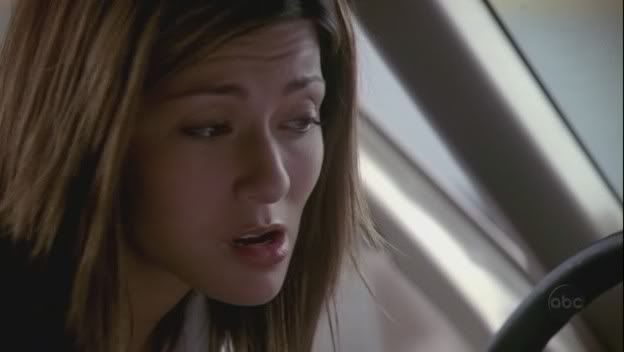 Which tells us she doesn't buy into the nuclear-powered nose cliche. Yeah, one smart girl. Another moment that furthers their relationship: at the crime scene where Lynn Bodner's body has been found, when Jim says to Karen, quickly, so as not to be overheard, "Yeah, well, I don't like having cases taken away from me for punk-ass reasons, do you?" 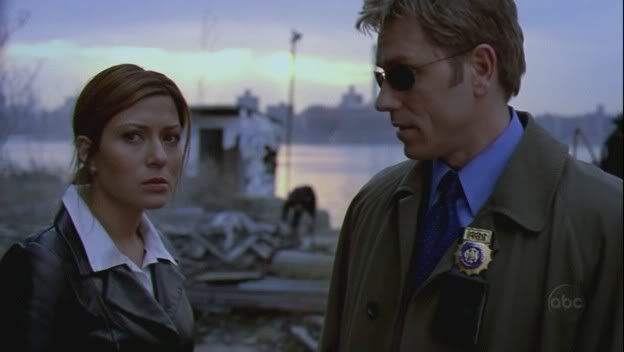 He hit the right nerve here. Karen has had a case taken away for a punk-ass reason -- she's been pulled off months of work on the Tongue Killer homicides to chauffeur "the blind guy" around to such career-makers as stolen cars and missing dog ashes. So she plays along, keeping quiet about Lynn Bodner's pross background so she and Jim can continue to work the case (or at least until Fisk accuses them of glory-hounding and yanks it away again). Dunbar is back on the job what -- one, two days at this point? Does he suggest he and Karen keep evidence to themselves because, even blind and in a precarious position within the Department, he still has the self-confidence (or "balls of steel") to buck the system when he needs to? Or is it because, after the last few days, he knows the only way he'll be able to prove his worth is by taking a few flying leaps? If he doesn't force the issue, in other words, he and Karen will be relegated to bad checks and stolen cars for the forseeable future. Or it is simply that for Dunbar, it's all about the case and doing whatever is necassary to close it? |
|
|
|
Post by housemouse on Sept 5, 2005 12:36:08 GMT -5
I really like Kyt's "enough rope to hang himself" theory. To my eyes, that is the most likely explanation.
Another possibility is that she is cutting him some slack because he is the wounded hero returning to combat so to speak. She figures blind or not, he is a more seasoned cop so she goes along for the ride.
As to why Jim pursued the case so aggressively so early on in his return, I think he said it best himself when he told Galloway, "I'm a cop." I think it was just his instinct to act that way, solve the case no matter what!
|
|
|
|
Post by maggiethecat on Sept 5, 2005 19:06:38 GMT -5
I really like Kyt's "enough rope to hang himself" theory. To my eyes, that is the most likely explanation. Another possibility is that she is cutting him some slack because he is the wounded hero returning to combat so to speak. She figures blind or not, he is a more seasoned cop so she goes along for the ride. As to why Jim pursued the case so aggressively so early on in his return, I think he said it best himself when he told Galloway, "I'm a cop." I think it was just his instinct to act that way, solve the case no matter what! ! Enough rope . . . and also a healthy curiosity to see how things play out. As for the back and forth between Jim and Karen in The Pilot, to a certain extent it's there in Jim's response to Fisk's, "What are you going to do at a crime scene?" "What I've always done," he responds. "Bounce ideas back and forth with my partner." (Or words to that effect.) How many examples do we have in this episode of Jim and Karen doing just that, "bouncing ideas" even though they barely know each other, and even though their relationship is adversarial at the outset? The cordite smell in the car. Karen's description of Lynn Bodner's leg wounds that Jim identifies as road rash. Most importantly in terms of closing the Tongue Killer case, Jim's wondering if the perp is "using the trains" and lives in another precinct, and the way in which Karen doesn't shut him down but picks up on the idea so they can run with it. I'm not sure, however, that Karen is cutting Jim slack because he's the wounded hero. The first several hours of being partnered together have brought her, what? She's pulled of a major case the squad has been working for months, and she's angry enough to hit him with Anne Donnelly when they're finally alone, in her car. She doesn't seem to be cutting him much slack at all! In fact, she still seems determined to rid herself of him fairly far into the case -- it's when they're in Chinatown on the bad check case that she tells him she wants to talk to Fisk about their "arrangement," and he stops her with his trains/different precinct theory. She may be intrigued by Dunbar, she may be curious about how good he is, but, really, up until the hellish scene at Randy Lyman's apartmnent, a very large part of her wants out. Again, what's great about their working relationship is that it's never black and white, cut and dried, or, for that matter, easy. It's the friction that keeps it interesting, that makes for the drama . . . and it's the friction that makes them such effective partners. Back to where we started . . . so, Mouse, are you saying that with Dunbar it's all about closing the case, which is why he'll buck the system and "hide" evidence from Fisk if need be? Okay, Kyt and mlm88, where do you stand on this? Let's keep talking.  |
|
|
|
Post by mlm828 on Sept 5, 2005 20:01:07 GMT -5
I think it's all of the above. And perhaps we see in the Pilot some glimpses of the pre-shooting Dunbar -- confident, determined, and assertive -- on his first two days back on the job.
After posting this, I realized this comment may need some explanation. I have always thought that, to Jim, "coming back" from being shot and losing his sight meant reclaiming as much of his former life as possible. That is one reason he was so determined to return to work as a cop and carry a gun. And we learn from his conversations with Dr. Galloway that being a cop is central to his idea of who he is. So when he returns to work, his intent, as he tells Fisk, is to do his job in the same way he always has. He is not going to make any changes in the way he does his job, other than those that are absolutely necessary. That is why I think the Pilot gives us a glimpse of the pre-shooting Dunbar.
Yes, bouncing ideas off his partner is what he's always done -- but it's fascinating to see the way he pulls a reluctant Karen along with him in pursuing his theories.
|
|
|
|
Post by hoosier on Sept 6, 2005 17:48:46 GMT -5
I had the chance to rewatch the Pilot over the weekend so here I go--
When Fisk was speaking with Jim in his office, he said the chief of D's was "under the impression" that Jim wanted to het back in the field. This doesn't sound like it was a foregone conclusion that he would be going into the field or that it was a part of his reinstatement. Maybe the chief was hoping that Jim would recognize his limitations and not push the issue.Maybe Jim ,when he was fighting to get his job back. didn't push it,afraid of being flatly denied the opportunity to prove himself. Fisk urged him to reconsider and remain inhouse,stating the obvious factors(no one ride with him, what do at crime scene etc.) so Jim plainly states that he is a homicide detective and not a civilian aide. This is what he was trained as, this is what he'd worked for. Later, when Tom said he could understand why Jim wanted back into the field(for him not doing paperwork),Jim said "that's where it is"--a homicide detective investigates in the field not in the squadroom and to be a real detetctive,even just to himself,he had to get back out there.
I think Jim wanted to be on the pross case,it was the big one and he had gotten himself up to speed on it and only wanted to know what had been kept out of the papers. Karen was afraid she would be "held Back",her own career in jeopardy, by being partnered with him--put on petty cases so he wouldn't be put in a dangerous situation or maybe so he would become frustrated and quit. Jim came into the case with a fresh pair of eyes ,so to speak. He said in Seoul Man,that he had been trained to look at several different leads and see what played out,not be so focused or locked onto one theory as to overlook or ignore evidence and he told Fisk that when it came to evidence he would be looking at it from a different angle. He was the one who came up with the stolen car angle and the use of the trains which lead them to Lyman. On an aside,I know some of the critics poo-pooed Dunbar at the scene in the warehouse.He called it a shooting gallery,probably having seen dozens in his career and so easily imagined; he had read the papers and would have known that the bodies were undressed; he would have heard the other cops moving around and the plastic sheet being draped over her so he would have had a good idea where they were located in space.
A pivotal scene is,I believe, the bathroom in Lyman's house, where Jim is taking deep breaths,flexing his fingers and clasping his hands as he tries to get his composure back before facing everyone. I am sure he had been questioning himself, as they all had, as to whether he could really function as a cop in the field and have his partner's back in a situation. I'm sure he had his own doubts. When he charged into that kitchen with his gun drawn,the gun he hadn't used since the bank, he was facing his moment of truth. He didn't question or second quess himself or his actions, he just reacted! He did what he had been trained to do. Only thing, I am sure he didn't expect it to happen on what was his second day back at work!!! And it would have been rewarding to him to hear Karen satnd up for him and say he had kept her from being killed.
Lastly, wow this has rambled on!! Sorry! When Christie asked him about his day. He had had to deal with the less than warm reception from the squad, he had endured Fisk's lecture, Terry had shown up, at his new precicnt and wanted to unload his own feelings, and here he was getting assigned to "punk-ass cases". Then to hear Christie seeming to question why he was back in homicide and already on a case, that was the last straw, He had dealt with negativity all day and he would have hoped she would have been more supportive. He jumped to the wrong conclusions because he was sooo touchy after that day and Christie caught the brunt of it.
|
|
|
|
Post by kytdunne on Sept 11, 2005 3:45:40 GMT -5
Plus, if the car turns out to be a major crime scene and not just a garden variety stolen car, her day just got a whole lot more interesting. I like how you put that. He hit the right nerve here. Karen has had a case taken away for a punk-ass reason -- she's been pulled off months of work on the Tongue Killer homicides to chauffeur "the blind guy" around to such career-makers as stolen cars and missing dog ashes. I liked how Dunbar turned that. Rather than clashing with her over getting lousy cases because he's blind, he teams up with her over getting lousy cases because of punk-ass reasons. Nice shift there, that could've well made the difference between them making it as a team, or not. Dunbar is back on the job what -- one, two days at this point? Does he suggest he and Karen keep evidence to themselves because, even blind and in a precarious position within the Department, he still has the self-confidence (or "balls of steel") to buck the system when he needs to? Or is it because, after the last few days, he knows the only way he'll be able to prove his worth is by taking a few flying leaps? If he doesn't force the issue, in other words, he and Karen will be relegated to bad checks and stolen cars for the forseeable future. Or it is simply that for Dunbar, it's all about the case and doing whatever is necassary to close it? I think it's Dunbar still in the fight for his career, combined with the drive to solve a case. When he suggests Karen keep the info between them, he's fighting for his career. Fisk has made it pretty clear which way things will go if Dunbar obediently falls into line. And he's also forging that team mentality, as mentioned above. Granted, Karen could've ignored him entirely, but she didn't. He's been fighting to get his job back for a good portion of the year, and he's not done yet. He's just gotten a step closer and then he's immediately shoved half a step back. So, I don't think he's doing anything different than he has been doing. The stage has changed, but he's still alone in his fight for his job. Karen's not actively blocking him, but she's not entirely an asset yet, either. I don't think we're seeing him making flying leaps. The balance is still weighted too heavily against him. If he'd been wrong about the cordite, it'd have been hellish to try to get Karen or anyone else listen to him (can you imagine the fall-out in the squad when he said he'd smelled the cop's cologne later on?). I'd say the only things he'd strongly push for ("this is a crime scene") are those he's very certain of. We know from "Up on the Roof" that if he chases a lead to its conclusion and finds out he's been wrong, he's also willing to apologize and step back. He's not interested in forcing his theory into the answer. He's searching *for* the answer. So if it comes off as a flying leap to someone not following his train of thought, then it does, but I don't think it's unusual to his character or any different than he normally works. Kyt |
|
|
|
Post by kytdunne on Sept 11, 2005 4:03:22 GMT -5
And perhaps we see in the Pilot some glimpses of the pre-shooting Dunbar -- confident, determined, and assertive -- on his first two days back on the job. After posting this, I realized this comment may need some explanation. I have always thought that, to Jim, "coming back" from being shot and losing his sight meant reclaiming as much of his former life as possible. That is one reason he was so determined to return to work as a cop and carry a gun. And we learn from his conversations with Dr. Galloway that being a cop is central to his idea of who he is. So when he returns to work, his intent, as he tells Fisk, is to do his job in the same way he always has. He is not going to make any changes in the way he does his job, other than those that are absolutely necessary. That is why I think the Pilot gives us a glimpse of the pre-shooting Dunbar. Expand on this more? You're talking in terms of glimpses of the pre-shooting Dunbar, and I don't think he's that different but for the physical limitations imposed upon him and the changes that come about as a result. As for how he addresses those changes, they're still mostly just concession to needing to do things differently. Like getting Sonny in private in a well-known area before he slams him against the wall. I think there are personality shifts that have occurred, but not enough to think we're only getting glimpses of the guy he 'used to be.' Am I way off from the way you're viewing him? Kyt |
|
|
|
Post by kytdunne on Sept 11, 2005 4:15:37 GMT -5
And it would have been rewarding to him to hear Karen satnd up for him and say he had kept her from being killed. That's a fave sequence of mine. When Dunbar sits back for a moment and lets the squad argue around/about him, with Bettancourt backing him. " We deserve a shot." It's satisfying. Kyt |
|
|
|
Post by mlm828 on Sept 11, 2005 13:55:28 GMT -5
You're talking in terms of glimpses of the pre-shooting Dunbar, and I don't think he's that different but for the physical limitations imposed upon him and the changes that come about as a result. As for how he addresses those changes, they're still mostly just concession to needing to do things differently. Like getting Sonny in private in a well-known area before he slams him against the wall. I think there are personality shifts that have occurred, but not enough to think we're only getting glimpses of the guy he 'used to be.' Am I way off from the way you're viewing him? Kyt We're basically on the same page here. You're only "way off" if you think we disagree on this point.  What I was trying to say in my explanation of my "glimpse" comment was that he hadn't changed and didn't want to change the way he did his job any more than necessary. Because of this, the Dunbar we see in the Pilot is a lot like the pre-shooting Dunbar. |
|
|
|
Post by kytdunne on Sept 12, 2005 1:05:36 GMT -5
We're basically on the same page here. You're only "way off" if you think we disagree on this point.  I'm asking. Haven't formed an opinion. What I was trying to say in my explanation of my "glimpse" comment was that he hadn't changed and didn't want to change the way he did his job any more than necessary. This part, I get. Because of this, the Dunbar we see in the Pilot is a lot like the pre-shooting Dunbar. This is where you lose me. Same confusion I had with the earlier post. I'm not sure if you're saying that: Dunbar hasn't changed much, and we can tell that from the Pilot. Dunbar has changed, and we only see glimpses of his former self in the Pilot (to contrast the Dunbar we know). Or something else. Kyt |
|
|
|
Post by housemouse on Sept 12, 2005 9:37:23 GMT -5
This is where you lose me. Same confusion I had with the earlier post. I'm not sure if you're saying that: Dunbar hasn't changed much, and we can tell that from the Pilot. Dunbar has changed, and we only see glimpses of his former self in the Pilot (to contrast the Dunbar we know). Or something else. Kyt Could it be that Dunbar is fighting like heck to avoid changing? He is doing everything he possibly can to be the way he used to be. |
|
|
|
Post by maggiethecat on Sept 12, 2005 12:21:00 GMT -5
Glimpses of the old Dunbar . . . hmm. Dunbar hasn’t changed much, and we can tell that from The Pilot.
Dunbar has changed, and we only see glimpses of his former self, to contrast the Dunbar we know.
Or something else.Or D, all of the above. The major change, of course, is the blindness that’s the linchpin of the series. And this has, obviously, necessitated changes in Jim’s behavior – he’s been forced into dependence on others simply to get from A to B: Hank or the cane, Karen. And for a man whom you could easily imagine never asking for help from anyone, he really does handle this aspect of his new life with a blunt kind of common sense: he doesn’t have a choice. Yes, he's fighting to avoid changing, but he's also wise enough to recognize the changes that aren't negotiable. So apart from the inescapable physical limitations, has Jim really changed the way he does his job? Not in terms of the way he thinks, not in terms of the way he conducts interviews, not in terms of the way he follows leads or processes evidence. The way he lays it out for Fisk in their first meeting is pretty much the way it plays out. He'll "do what he's always done": bounce ideas back and forth with his partner, conduct interviews, etc. (The major difference, Jim's one "concession" that turns out to be a wild card, is in assuming he will only use his gun "in a struggle up close.") It's the way he's envisioned doing his job after reinstatement, and he's had plenty of time to think it through. Has his character, his personality, changed? He’s still smart and determined and complex, still one terrific detective with a quick wit and an engaging manner, but forced by circumstance to be constantly on the defensive. Blind Jim has something to prove, every minute of the day, and that’s new. So some things have changed, and some haven’t. He can still do his job. But what does it cost him? As Christie points out in “Doggone,” it takes everything he has just to get through each day (which may get my vote as the most understanding thing she ever said to him). To still be, essentially, the Old Dunbar now takes enormous amounts of energy and concentration, and this is where I am once again in awe of the creative team. We see what it costs Jim to stay at the top of his game, and it’s brilliantly done, deepening not only our understanding of the character, but our involvement and empathy. And we have three clear examples in The Pilot: 1. Homecoming the first night. He’s down to his last ounce of energy. You can tell by his body language, by the way he doesn’t want to get into it with Christie – “It was good,” he says with forced cheer. “I was busy.” – and by the way he shuts down when she pushes for some honesty. 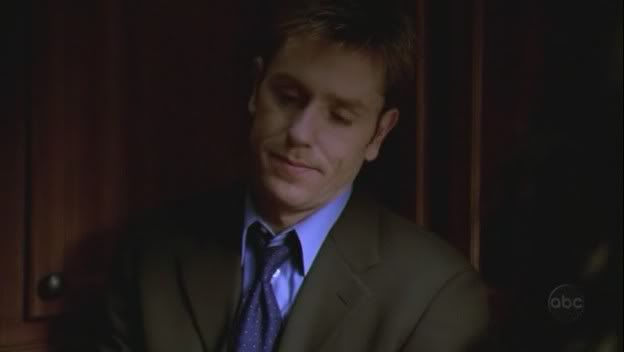 Start with the fact that the first day back at work after a year off, no matter what your job is or what you’ve been doing during that year, is going to be draining. Add about fifteen layers of distrust and suspicion and condescending attitudes, having to defend yourself all . . . day . . . long, and then just for good measure throw in a confrontation with good old Terry Jansen. Small wonder Jim would rather flip a ball against the living room wall than talk to one more person, even his wife, about what he’s trying to do, and why. He's been keeping his guard up all day and it's worn him down. He just doesn't have anything left. 2. Pulling the gun on Randy Lyman. This is another great example of the way the writers constructed "bookends," starting with the shots of Dunbar’s eyes, sighted and blind, that frame the bank robbery nightmare. (We should start a Mirror Images thread.) Contrast the Old Dunbar drawing on the gunman, purposefully and confidently . . .  . . . with the New Dunbar drawing on Randy Lyman.  He gets there in the end – his steely calm and self-assuredness when he’s finally positioned and knows he aimed at Lyman is absolutely the Old Dunbar – but we see what it took out of him, after, when he tries to pull himself together. (For a glorious piece of “acting” -- acting in quotes because I don’t think Ron Eldard acted so much as he lived in Dunbar’s skin -- watch the way he comes skidding into that kitchen, panicked and confused . . .  . . . and then follow the transition as he orients himself and takes control of the situation. Compelling is hardly the word.) 3. The Interrogation of Randy Lyman: It is satisfying, isn’t it? Not only does Dunbar get the job done, he uses it to make important points with The Boys Club behind the mirror. But again, we are shown what it costs him, when Lyman’s confessed and he’s leaning against the wall . . . the sound around him fades and we see his sense of accomplishment but also the exhaustion, his face haggard and strained. 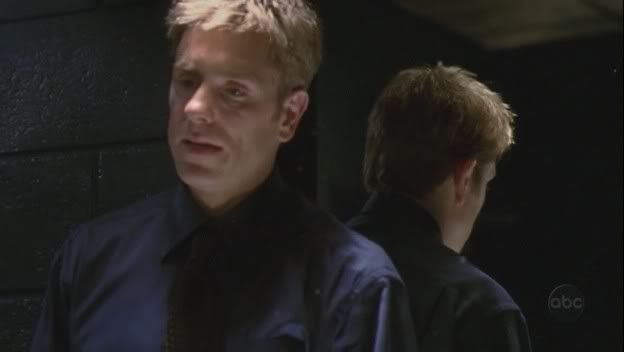 I have to wonder if, after a successful interrogation like this one, the Old Dunbar would have strolled out of the room whistling and ready for a beer with the guys. Then again, far more was riding on this interrogation than a confession. So maybe Dunbar hasn’t changed all that much. He can still be who, and what, he wants to be . . . "I'm a cop." . . . it’s just going to take more concentration, stamina, and sheer guts than it once did. Maybe the major difference is, now, nothing comes easy. |
|
|
|
Post by mlm828 on Sept 12, 2005 16:45:13 GMT -5
Thanks, mouse and maggie, for explaining what I was saying -- or trying to say -- better than I did.
|
|

